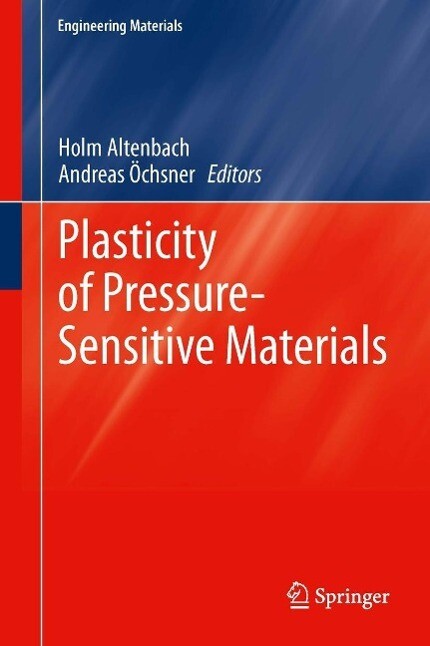
ISBN: 9783642409455
Classical plasticity theory of metals is independent of the hydrostatic pressure. However if the metal contains voids or pores or if the structure is composed of cells, this classical ass… Más…
| Springer.com Nr. 978-3-642-40945-5. Gastos de envío:Worldwide free shipping, , DE. (EUR 0.00) Details... |

2014, ISBN: 9783642409455
Editor: Altenbach, Holm, Editor: Öchsner, Andreas, Springer, Kindle Edition, Auflage: 2014, 646 Seiten, Publiziert: 2014-07-08T00:00:00.000Z, Produktgruppe: Digital Ebook Purchas, Mechani… Más…
| amazon.co.uk |

ISBN: 9783642409455
*Plasticity of Pressure-Sensitive Materials* / pdf eBook für 96.49 € / Aus dem Bereich: eBooks, Sachthemen & Ratgeber, Technik Medien > Bücher nein eBook als pdf eBooks > Sachthemen & Rat… Más…
| Hugendubel.de Gastos de envío:In stock (Download), , Versandkostenfrei nach Hause oder Express-Lieferung in Ihre Buchhandlung., DE. (EUR 0.00) Details... |

2014, ISBN: 9783642409455
eBooks, eBook Download (PDF), 2014, [PU: Springer Berlin], Seiten: 376, Springer Berlin, 2014
| lehmanns.de Gastos de envío:Download sofort lieferbar. (EUR 0.00) Details... |

2014, ISBN: 9783642409455
eBooks, eBook Download (PDF), Auflage, [PU: Springer-Verlag], [ED: 1], Springer-Verlag, 2014
| lehmanns.de Gastos de envío:Download sofort lieferbar. (EUR 0.00) Details... |

ISBN: 9783642409455
Classical plasticity theory of metals is independent of the hydrostatic pressure. However if the metal contains voids or pores or if the structure is composed of cells, this classical ass… Más…

2014, ISBN: 9783642409455
Editor: Altenbach, Holm, Editor: Öchsner, Andreas, Springer, Kindle Edition, Auflage: 2014, 646 Seiten, Publiziert: 2014-07-08T00:00:00.000Z, Produktgruppe: Digital Ebook Purchas, Mechani… Más…

ISBN: 9783642409455
*Plasticity of Pressure-Sensitive Materials* / pdf eBook für 96.49 € / Aus dem Bereich: eBooks, Sachthemen & Ratgeber, Technik Medien > Bücher nein eBook als pdf eBooks > Sachthemen & Rat… Más…

2014, ISBN: 9783642409455
eBooks, eBook Download (PDF), 2014, [PU: Springer Berlin], Seiten: 376, Springer Berlin, 2014

2014, ISBN: 9783642409455
eBooks, eBook Download (PDF), Auflage, [PU: Springer-Verlag], [ED: 1], Springer-Verlag, 2014
Datos bibliográficos del mejor libro coincidente
Detalles del libro - Plasticity of Pressure-Sensitive Materials (Engineering Materials)
EAN (ISBN-13): 9783642409455
ISBN (ISBN-10): 3642409458
Año de publicación: 2013
Editorial: Springer
Libro en la base de datos desde 2014-06-24T07:27:07-05:00 (Mexico City)
Página de detalles modificada por última vez el 2023-08-10T05:32:46-06:00 (Mexico City)
ISBN/EAN: 9783642409455
ISBN - escritura alterna:
3-642-40945-8, 978-3-642-40945-5
Mode alterno de escritura y términos de búsqueda relacionados:
Autor del libro: alten, alt, altenbach holm, ochs, andreas ochsner, andre holm
Título del libro: plasticity
Datos del la editorial
Autor: Holm Altenbach; Andreas Öchsner
Título: Engineering Materials; Plasticity of Pressure-Sensitive Materials
Editorial: Springer; Springer Berlin
376 Páginas
Año de publicación: 2014-07-08
Berlin; Heidelberg; DE
Idioma: Inglés
96,29 € (DE)
99,00 € (AT)
118,00 CHF (CH)
Available
X, 376 p. 191 illus., 66 illus. in color.
EA; E107; eBook; Nonbooks, PBS / Technik/Maschinenbau, Fertigungstechnik; Maschinenbau: Festkörpermechanik; Verstehen; biomaterials; micro-macro-interaction; polymers; porous media; voids; C; Solid Mechanics; Materials Science; Classical Mechanics; Engineering; Materialwissenschaft; Klassische Mechanik; BB
Classical plasticity theory of metals is independent of the hydrostatic pressure. However if the metal contains voids or pores or if the structure is composed of cells, this classical assumption is no more valid and the influence of the hydrostatic pressure must be incorporated in the constitutive description. Looking at the microlevel, metal plasticity is connected with the uniform planes of atoms organized with long-range order. Planes may slip past each other along their close-packed directions. The result is a permanent change of shape within the crystal and plastic deformation. The presence of dislocations increases the likelihood of planes slipping.
Nowadays, the theory of pressure sensitive plasticity is successfully applied to many other important classes of materials (polymers, concrete, bones etc.) even if the phenomena on the micro-level are different to classical plasticity of metals. The theoretical background of this phenomenological approach based on observations on the macro-level is described in detail in this monograph and applied to a wide range of different important materials in the last part of this book.
Part I:Experimental Observations.- Part II: Theoretical Foundation.- Summary of Continuum mechanics.- Yield Criteria.- Theory of Plasticity.- Part III: Applications.- Metal Forming.- Powder.- Concrete.- Soil and Rock.- Porous Metals.- Cellular.- Human.- Adhesives and Polymers.- Part IV: Some Mathematics.
Classical plasticity theory of metals is independent of the hydrostatic pressure. However, if the metal contains voids or pores or if the structure is composed of cells, this classical assumption is no more valid and the influence of the hydrostatic pressure must be incorporated in the constitutive description. Looking at the microlevel, metal plasticity is connected with the uniform planes of atoms organized with long-range order. Planes may slip past each other along their close-packed directions. The result is a permanent change of shape within the crystal and plastic deformation. The presence of dislocations increases the likelihood of planes slipping.
Nowadays, the theory of pressure sensitive plasticity is successfully applied to many other important classes of materials (polymers, concrete, bones etc.) even if the phenomena on the micro-level are different to classical plasticity of metals. The theoretical background of this phenomenological approach based on observations on the macro-level is described in detail in this monograph and applied to a wide range of different important materials in the last part of this book.
Summarizes new trends and established methods in the field of pressure-sensitive materials Presents results of 6 leading research groups Offers modeling approaches which are applicable in a wide range of modern engineering Includes supplementary material: sn.pub/extras
Más, otros libros, que pueden ser muy parecidos a este:
Último libro similar:
9783662519233 Plasticity of Pressure-Sensitive Materials (Engineering Materials) (Herausgegeben:Öchsner, Andreas; Altenbach, Holm)
< para archivar...

